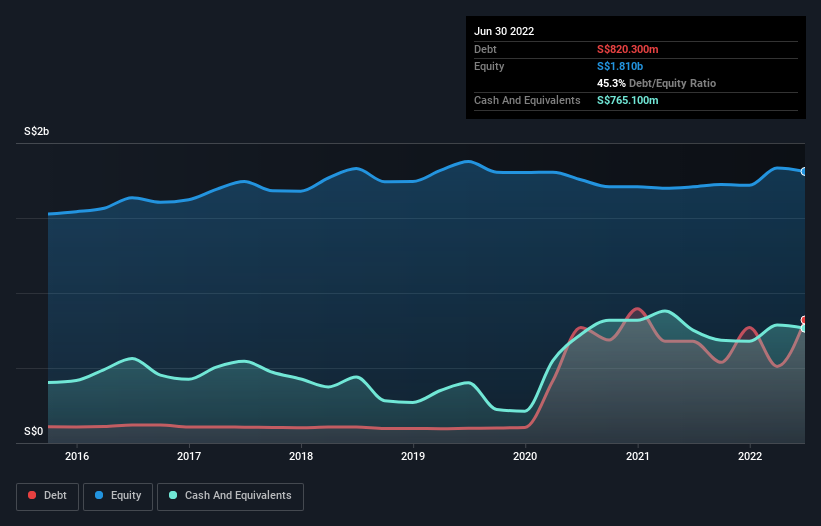David Iben put it well when he said, 'Volatility is not a risk we care about. What we care about is avoiding the permanent loss of capital.' So it might be obvious that you need to consider debt, when you think about how risky any given stock is, because too much debt can sink a company. We note that SATS Ltd. (SGX:S58) does have debt on its balance sheet. But should shareholders be worried about its use of debt?
What Risk Does Debt Bring?
Debt assists a business until the business has trouble paying it off, either with new capital or with free cash flow. Part and parcel of capitalism is the process of 'creative destruction' where failed businesses are mercilessly liquidated by their bankers. However, a more common (but still painful) scenario is that it has to raise new equity capital at a low price, thus permanently diluting shareholders. By replacing dilution, though, debt can be an extremely good tool for businesses that need capital to invest in growth at high rates of return. The first step when considering a company's debt levels is to consider its cash and debt together.
View our latest analysis for SATS
What Is SATS's Net Debt?
You can click the graphic below for the historical numbers, but it shows that as of June 2022 SATS had S$820.3m of debt, an increase on S$678.5m, over one year. However, because it has a cash reserve of S$765.1m, its net debt is less, at about S$55.2m.

How Strong Is SATS' Balance Sheet?
Zooming in on the latest balance sheet data, we can see that SATS had liabilities of S$715.1m due within 12 months and liabilities of S$820.3m due beyond that. Offsetting these obligations, it had cash of S$765.1m as well as receivables valued at S$390.0m due within 12 months. So its liabilities outweigh the sum of its cash and (near-term) receivables by S$380.3m.
Of course, SATS has a market capitalization of S$4.62b, so these liabilities are probably manageable. But there are sufficient liabilities that we would certainly recommend shareholders continue to monitor the balance sheet, going forward. Carrying virtually no net debt, SATS has a very light debt load indeed. The balance sheet is clearly the area to focus on when you are analysing debt. But it is future earnings, more than anything, that will determine SATS's ability to maintain a healthy balance sheet going forward. So if you want to see what the professionals think, you might find this free report on analyst profit forecasts to be interesting.
In the last year SATS wasn't profitable at an EBIT level, but managed to grow its revenue by 23%, to S$1.3b. Shareholders probably have their fingers crossed that it can grow its way to profits.
Caveat Emptor
While we can certainly appreciate SATS's revenue growth, its earnings before interest and tax (EBIT) loss is not ideal. To be specific the EBIT loss came in at S$80m. Considering that alongside the liabilities mentioned above does not give us much confidence that company should be using so much debt. Quite frankly we think the balance sheet is far from match-fit, although it could be improved with time. However, it doesn't help that it burned through S$53m of cash over the last year. So suffice it to say we do consider the stock to be risky. For riskier companies like SATS I always like to keep an eye on the long term profit and revenue trends. Fortunately, you can click to see our interactive graph of its profit, revenue, and operating cashflow.
Of course, if you're the type of investor who prefers buying stocks without the burden of debt, then don't hesitate to discover our exclusive list of net cash growth stocks, today.
New: Manage All Your Stock Portfolios in One Place
We've created the ultimate portfolio companion for stock investors, and it's free.
• Connect an unlimited number of Portfolios and see your total in one currency
• Be alerted to new Warning Signs or Risks via email or mobile
• Track the Fair Value of your stocks
Have feedback on this article? Concerned about the content? Get in touch with us directly. Alternatively, email editorial-team (at) simplywallst.com.
This article by Simply Wall St is general in nature. We provide commentary based on historical data and analyst forecasts only using an unbiased methodology and our articles are not intended to be financial advice. It does not constitute a recommendation to buy or sell any stock, and does not take account of your objectives, or your financial situation. We aim to bring you long-term focused analysis driven by fundamental data. Note that our analysis may not factor in the latest price-sensitive company announcements or qualitative material. Simply Wall St has no position in any stocks mentioned.
About SGX:S58
SATS
An investment holding company, provides gateway services and food solutions in Singapore, the Asia Pacific, the Americas, Europe, the Middle East, Africa, and internationally.
Solid track record with moderate growth potential.
Market Insights
Community Narratives





